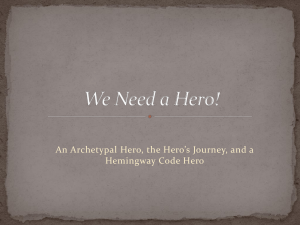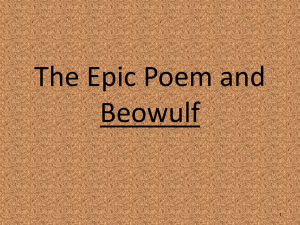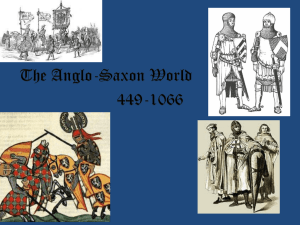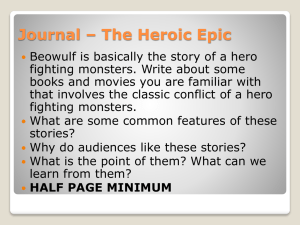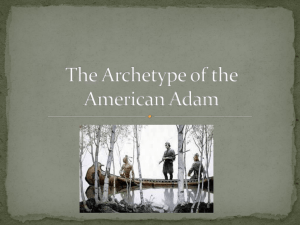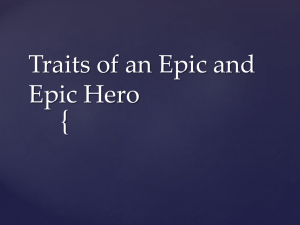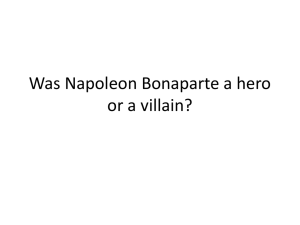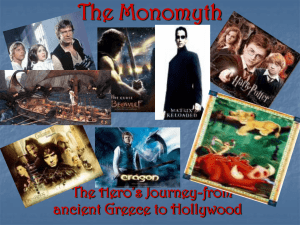Beowulf and the Monomyth (PPT)
advertisement
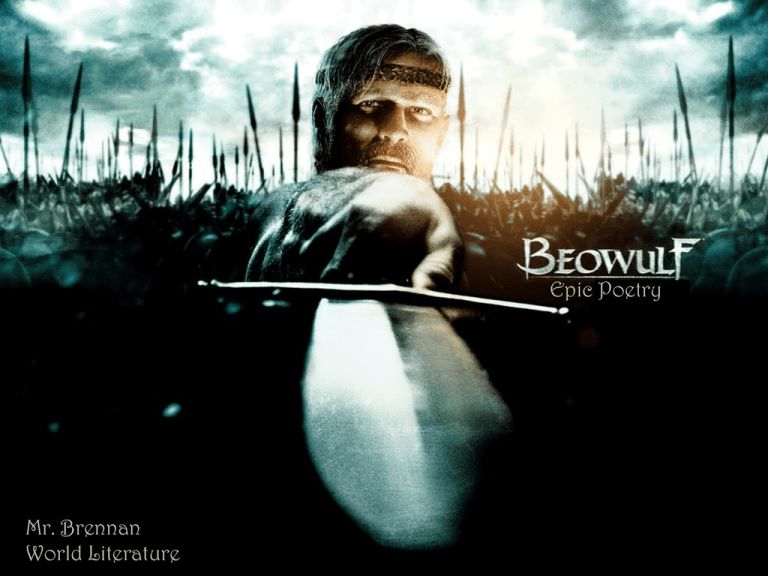
Epic Poetry Mr. Brennan World Literature Beowulf and the Monomyth Learning Objective SWBAT compose a thesis statement and outline in preparation for an analytical essay. 1. Review: Beowulf and the Monomyth 2. Workshop: Thesis & Outline 3. Video: Beowulf Homework Reminders 1. Write Beowulf Essay Introduction Final Unit Assessment In a 1250 word essay, examine the Anglo-Saxon hero, Beowulf, as well as a person you believe to be a hero in contemporary culture, and evaluate how they parallel with Campbell’s Monomyth? Ordinary World & Call to Adventure While in mundane situation, the hero's journey begins by becoming aware of the world outside his own. His journey is usually given to him by a herald who helps the hero by acting as a guide a into the unknown. [Limited/Increased awareness of problem.] Joseph Campbell’s MONOMYTH Refusal of the Call Often when the call is given, the future hero first refuses to heed it. This may be from a sense of duty or obligation, fear, insecurity, etc. [Fear/Resistance to change.] Freedom to Live Mastery leads to freedom from the fear of death, which in turn is the freedom to live. This is sometimes referred to as living in the moment, neither anticipating the future nor regretting the past. [Mastery] Supernatural Aids (Meeting with the Mentor) Once the hero has committed to the quest, consciously or unconsciously, his guide and magical helper appears, or becomes known, and may present the hero with training, equipment, or advice that will help later in their quest. [Overcoming fear] Master of Two Worlds (Return with the Elixir) Achieving a balance between the material and spiritual—the inner and outer worlds. (The hero returns bearing the treasure that has the power to transform the world as the hero has been transformed. (KNOWN) (UNKNOWN) RETURN DEPARTUR Rescue from Without Just as the hero may need aids to set out on the quest, oftentimes he or she must have powerful guides and rescuers to bring them back to everyday life, especially if the person has been wounded or weakened by the experience. [New challenge and rededication] The Magic Flight Sometimes the hero must escape with the boon, if it is something that the gods have been jealously guarding. It can be just as adventurous and dangerous returning from the journey as it was to go on it. Refusal of the Return Having found bliss and enlightenment in the other world, the hero may not want to return to the ordinary world to bestow the boon onto his fellow man. The Ultimate Boon (Reward) The ultimate boon is the achievement of the goal of the quest. It is what the person went on the journey to get. All the previous steps serve to prepare and purify the person for this step. [Accepting consequences of new life] Apotheosis (Supreme Ordeal) When someone dies a physical death, or dies to the self to live in spirit, he or she moves beyond the pairs of opposites to a state of divine knowledge, love, compassion and bliss. (Out of the moment of Mr. Brennan confronting death/fear comes a new life. World Literature [Big change with feelings of life and death] Crossing of the First Threshold This is the point where the person crosses into the field of adventure, leaving the known limits of his world and venturing into an unknown and dangerous realm where the rules and limits are not known. [Committing to change; Cultural Disassociation] Belly of The Whale The belly of the whale represents the final separation from the hero's known world and self. By entering this stage, the person shows willingness to undergo a metamorphosis. INITIATION Road of Trials The road of trials is a series of tests, tasks, or ordeals that the hero must undergo to begin the transformation. Often the hero fails one or more of these tests, which often occur in threes. Meeting With the Goddess This is the point when the person experiences a love that has the power and significance of the all-powerful, all encompassing, unconditional love that a fortunate infant may experience with his or her mother. Woman as Temptress In this step, the hero faces those temptations, often of a physical or pleasurable nature, that may lead him or her to abandon or stray from his or her quest. [Experiencing new conditions.] Atonement with the Father (Innermost Cave / Approach) In this step the person must confront and be initiated by whatever holds the ultimate power in his or her life. In many myths and stories this is the father, or a father figure who has life and death power. This is the center point of the journey. (The hero and newfound allies prepare for the major challenge in the special world) [Preparing for major change.] TESTS, ALLIES, & ENEMIES THE ROAD BACK Crossing of the Return Threshold (Resurrection) The trick is to retain the wisdom gained, to integrate it into a human life, and figure out how to share the wisdom with the world. (Another moment of death/rebirth, but on a more complete level. Hero resolves the original conflict. [Last attempts, final dangers; Growth at reintegration] Beowulf is called to adventure when he hears the stories of Grendel. Beowulf does not refuse the call, but embraces it as a true AngloSaxon hero; the most honorable fate would be to find death in battle. God offers Beowulf the strength to conquer Grendel without weaponry and the ancient heirloom to defeat his mother; Hrothgar offers wise advice; Unferth offers an ancient blade Ordinary World & Call to Adventure While in mundane situation, the hero's journey begins by becoming aware of the world outside his own. His journey is usually given to him by a herald who helps the hero by acting as a guide a into the unknown. [Limited/Increased awareness of problem.] Beowulf’s crossing the sea to Denmark is a threshold in which he commits to change and disconnects from his native culture Refusal of the Call Often when the call is given, the future hero first refuses to heed it. This may be from a sense of duty or obligation, fear, insecurity, etc. [Fear/Resistance to change.] Supernatural Aids (Meeting with the Mentor) Once the hero has committed to the quest, consciously or unconsciously, his guide and magical helper appears, or becomes known, and may present the hero with training, equipment, or advice that will help later in their quest. [Overcoming fear] (KNOWN) (UNKNOWN) DEPARTUR Crossing of the First Threshold This is the point where the person crosses into the field of adventure, leaving the known limits of his world and venturing into an unknown and dangerous realm where the rules and limits are not known. [Committing to change; Cultural Disassociation] Belly of The Whale The belly of the whale represents the final separation from the hero's known world and self. By entering this stage, the person shows willingness to undergo a metamorphosis. Beowulf separates himself from his men to travel alone in his decent into Grendel’s mother’s lair. DEPARTURE THE ROAD B INITIATION Refusal of the Return Having found bliss and enlightenment in the other world, the hero may not want to return to the ordinary world to bestow the boon onto his fellow man. The Ultimate Boon (Reward) The ultimate boon is the achievement of the goal of the quest. It is what the person went on the journey to get. All the previous steps serve to prepare and purify the person for this step. [Accepting consequences of new life] Apotheosis (Supreme Ordeal) When someone dies a physical death, or dies to the self to live in spirit, he or she moves beyond the pairs of opposites to a state of divine knowledge, love, compassion and bliss. (Out of the moment of Mr. Brennan confronting death/fear comes a new life. World Literature [Big change with feelings of life and death] INITIATION Road of Trials The road of trials is a series of tests, tasks, or ordeals that the hero must undergo to begin the transformation. Often the hero fails one or more of these tests, which often occur in threes. Meeting With the Goddess This is the point when the person experiences a love that has the power and significance of the all-powerful, all encompassing, unconditional love that a fortunate infant may experience with his or her mother. Woman as Temptress In this step, the hero faces those temptations, often of a physical or pleasurable nature, that may lead him or her to abandon or stray from his or her quest. [Experiencing new conditions.] Atonement with the Father (Innermost Cave / Approach) In this step the person must confront and be initiated by whatever holds the ultimate power in his or her life. In many myths and stories this is the father, or a father figure who has life and death power. This is the center point of the journey. (The hero and newfound allies prepare for the major challenge in the special world) [Preparing for major change.] Beowulf’s father figure can be represented by Fate/God, who Beowulf must accept as the possessor of ultimate power. Father figure can also be seen as Hrothgar or Hyglec, who Beowulf confronts to gain acceptance, and is embraced as a son There is no temptress; perhaps, again, due to Anglo-Saxon warrior culture. Although it never overcame him, his own pride could have tempted him from his never-ending glory. Beowulf lacks female influence, perhaps due to Anglo-Saxon warrior culture; however, Wealhtheow gives Beowulf a “torque of gold” for luck. Beowulf’s journey comprises of three major trials; another trial includes his journey to reach Grendel’s mother’s lair, which is protected by creatures. TESTS, ALLIES, & ENEMIES The Magic Flight Sometimes the hero must escape with the boon, if it is something that the gods have been jealously guarding. It can be just as adventurous and dangerous returning from the journey as it was to go on it. THE ROAD B INITIATION Road of Trials The road of trials is a series of tests, tasks, or ordeals that the hero must undergo to begin the transformation. Often the hero fails one or more of these tests, which often occur in threes. Meeting With the Goddess This is the point when the person experiences a love that has the power and significance of the all-powerful, all encompassing, unconditional love that a fortunate infant may experience with his or her mother. INITIATION Refusal of the Return Having found bliss and enlightenment in the other world, the hero may not want to return to the ordinary world to bestow the boon onto his fellow man. The Ultimate Boon (Reward) The ultimate boon is the achievement of the goal of the quest. It is what the person went on the journey to get. All the previous steps serve to prepare and purify the person for this step. [Accepting consequences of new life] Apotheosis (Supreme Ordeal) When someone dies a physical death, or dies to the self to live in spirit, he or she moves beyond the pairs of opposites to a state of divine knowledge, love, compassion and bliss. (Out of the moment of Mr. Brennan confronting death/fear comes a new life. World Literature [Big change with feelings of life and death] Woman as Temptress In this step, the hero faces those temptations, often of a physical or pleasurable nature, that may lead him or her to abandon or stray from his or her quest. [Experiencing new conditions.] Atonement with the Father (Innermost Cave / Approach) In this step the person must confront and be initiated by whatever holds the ultimate power in his or her life. In many myths and stories this is the father, or a father figure who has life and death power. This is the center point of the journey. (The hero and newfound allies prepare for the major challenge in the special world) [Preparing for major change.] TESTS, ALLIES, & ENEMIES The Magic Flight Sometimes the hero must escape with the boon, if it is something that the gods have been jealously guarding. It can be just as adventurous and dangerous returning from the journey as it was to go on it. Beowulf reaches the lowest point of his journey when he faces Grendel’s mother; for the first time we see, as does he, that he is not immortal; he changes his approach to battle. His men believe him to be dead, but he is victorious, ascends, and is reborn as a true hero. Beowulf brings back Grendel’s head and the hilt of the giant sword back to Heorot; thus, ridding the Danes of monsters. While this serves as a literal boon, Beowulf has brought knowledge back that one can defeat monsters and revive salvation. A theme also echoed in the battle against the dragon. Though Beowulf dies, he lives on forever; the ultimate boon becomes the story of Beowulf, the story of a hero. The tale doesn’t Joseph Campbell’ssimply tell that dragons are real, but that dragons can be defeated. Freedom to Live Mastery leads to freedom from the fear of death, which in turn is the freedom to live. This is sometimes referred to as living in the moment, neither anticipating the future nor regretting the past. [Mastery] Master of Two Worlds (Return with the Elixir) Achieving a balance between the material and spiritual—the inner and outer worlds. (The hero returns bearing the treasure that has the power to transform the world as the hero has been transformed. (KNOWN) Crossing of the Return Threshold (Resurrection) The trick is to retain the wisdom gained, to integrate it into a human life, and figure out how to share the wisdom with the world. (Another moment of death/rebirth, but on a more complete level. Hero resolves the original conflict. [Last attempts, final dangers; Growth at reintegration] THE ROAD BACK After being wounded, Beowulf receives help from his loyal thane, Wiglaf, who enables Beowulf to defeat the dragon, claim treasure for his people, and eventually sings the song of Beowulf. Beowulf must defeat the dragon in order for his story to be told; the story becomes the essential knowledge which empowers a hero-centric war culture standing at the crux of Anglo-Saxon religion Ordi Call t Whi the w [ MONOMYTH Becomes master of Geatland & Denmark; of the super-natural world through Christ and of the human world through his immortal tale. In defeating the dragon, Beowulf retains his boon and crosses into the afterlife, but is resurrected in the telling of his heroic tale. RETURN (UNKNOWN) RETURN Rescue from Without Just as the hero may need aids to set out on the quest, oftentimes he or she must have powerful guides and rescuers to bring them back to everyday life, especially if the person has been wounded or weakened by the experience. [New challenge and rededication] The Magic Flight Sometimes the hero must escape with the boon, if it is something that the gods have been jealously guarding. It can be just as adventurous and dangerous returning from the journey as it was to go on it. INITIAT Refusal of the Return Having found bliss and enlightenment in the other world, the hero may not want to return to the ordinary world to bestow the boon onto his fellow man. The Ultimate Boon (Reward) The ultimate boon is the achievement of the goal of the quest. It is what the person went on the journey to get. All the previous steps serve to prepare and purify the person for this step. [Accepting consequences of new life] Apotheosis (Supreme Ordeal) When someone dies a physical death, or dies to the self to live in spirit, he or she moves beyond the pairs of opposites to a state of divine knowledge, love, compassion and bliss. (Out of the moment of Mr. Brennan Beowulf does not falter and eagerly returns to Geatland. Atoneme In this ste holds the this is the This is the Final Unit Assessment In a 1250 word essay, examine the Anglo-Saxon hero, Beowulf, as well as a person you believe to be a hero in contemporary culture, and evaluate how they parallel with Campbell’s Monomyth? Outline In a 1250 word essay, examine the Anglo-Saxon hero, Beowulf, as well as a person you believe to be a hero in contemporary culture, and evaluate how they parallel with Campbell’s Monomyth? Intro: Thesis: Body Paragraph(s): Conclusion: Outline What is a hero? Who is Joseph Campbell? What is his notion of the monomyth? What is the purpose of the hero and the monomyth? (i.e. culturally and psychologically) The Anglo-Saxon hero, Beowulf, as well as the American hero, George Washington, adhere to Joseph Campbell’s monomyth, as they both complete the heroic journey revealing a great deal about their respective cultures and an individual's search for identity. 1. Departure 2. Initiation 3. Return In conclusion… • summary of main points • relation to our current society and/or lives
